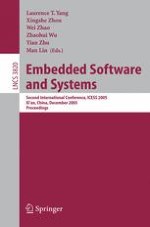2005 | OriginalPaper | Buchkapitel
Compiler-Directed Scratchpad Memory Management
verfasst von : Jingling Xue
Erschienen in: Embedded Software and Systems
Verlag: Springer Berlin Heidelberg
Aktivieren Sie unsere intelligente Suche, um passende Fachinhalte oder Patente zu finden.
Wählen Sie Textabschnitte aus um mit Künstlicher Intelligenz passenden Patente zu finden. powered by
Markieren Sie Textabschnitte, um KI-gestützt weitere passende Inhalte zu finden. powered by
On-chip memory, in the form of (hardware-managed) cache, (software-managed) scratchpad memory (SPM) or some combination of both, is widely used in embedded systems. Most high-end embedded systems have both cache and SPM on-chip since each addresses a different need. Caches allow easy integration and are often effective but are unpredictable. SPMs are more energy-efficient than caches since they do not need complex tag-decoding logic. In addition, SPMs provide absolutely predictable performance but the programmer or compiler must schedule explicit data/instruction transfers between the SPM and off-chip main memory in an embedded system. In today’s industry, this task is largely accomplished manually. The programmer often spends a lot of time on partitioning data and/or instructions and inserting explicit data/instruction transfers required between the SPM and main memory. Such a manual approach is time-consuming and error-prone. Obtaining satisfactory solutions for large application programs by hand can be challenging. Furthermore, hand-crafted code is not portable since it is usually customised for one particular architecture.
This talk introduces a compiler approach, called
memory coloring
, that we have recently developed to automatically allocating the arrays in a program to an SPM. The arrays are frequently used in embedded applications such as image processing and signal processing. The novelty of this approach lies in partitioning an SPM into a pseudo register file, splitting the live ranges of arrays to create potential data transfer statements between the SPM and off-chip main memory, and finally, adapting an existing graph-colouring algorithm for register allocation to assign the arrays in the program into the register file. This compiler-directed approach is efficient due to the practical efficiency of graph-colouring algorithms. We have implemented this work in the SUIF/machSUIF compiler framework. Preliminary results over benchmarks show that this compiler-directed approach represents a promising solution to automatic SPM management.
